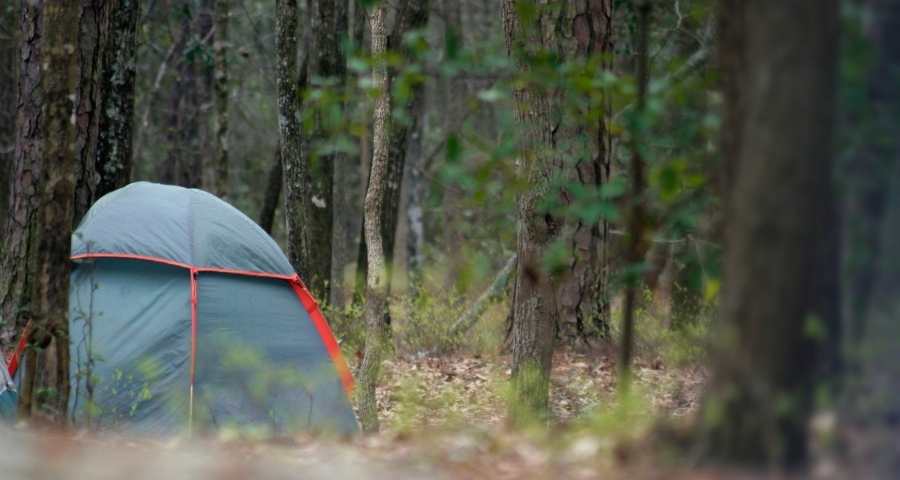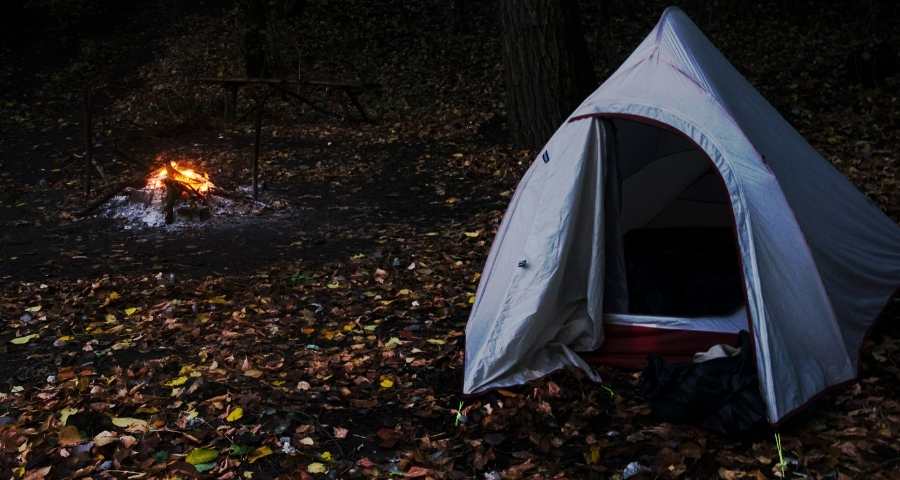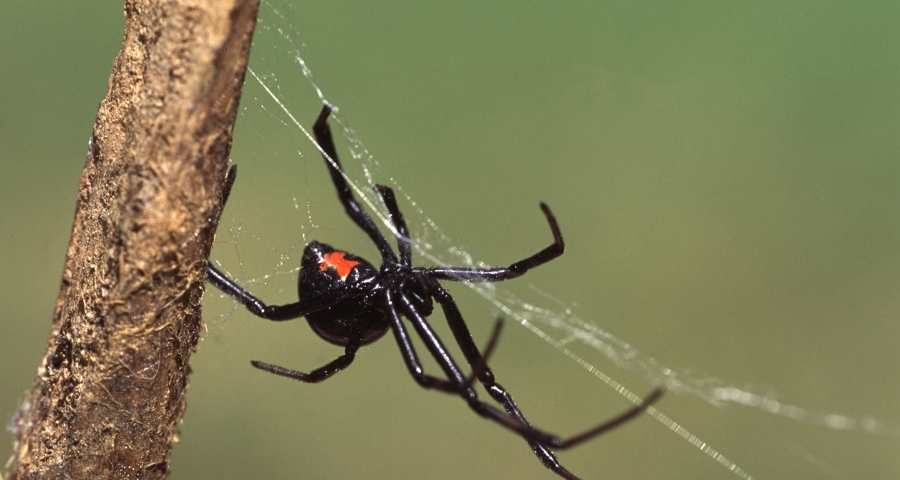Camping trips are fun. You get out there in the wild, surrounded by nature, with some good company (or solo) and food, and can really enjoy yourself for a couple of days.
But in the wilderness, nature is not always green tall trees and snow-covered mountains. It also houses creatures that can terrify us at times – creatures like spiders.
Although spiders are venomous and can put you at severe risk of an allergic reaction if they bite (you might not become a Spiderman, though), for most people, the mere thought of a spider is horrifying.
Today, I am going to tell you how to keep spiders away while sleeping while you are on a camping trip.
To keep spiders out of your camping tent, camp away from damp areas and trees, use a zip-tight tent with no holes, avoid perfumes and scented sprays at night, keep your tent clean from food leftovers, use suitable bug repellents, or apply natural insect repellents like vinegar, mint, or cedarwood.
Let’s discuss things in more detail and look at 6 sure ways you can keep spiders away from your tent and have a peaceful night sleep in the calm wilderness.
1. Select a suitable camping site
First of all, select a clean camping site away from water bodies, damps, and treelines. Spiders feed on other insects which are normally abundant in these areas.
They also need bushes and tree branches to make their webs to trap their trays, and from there they can crawl inside any living space like your tent.

If you can’t find a clean area away from bushes for setting up your tent or you are in a thick forest with plenty of trees around, use a tent tarp above your tent so that the spiders don’t fall from above.
2. Dispose of left over food
Spiders feed on bugs, and like all living beings, they are always in search of more food. If your tent is littered with food leftovers or other items that can attract insects, you are ultimately attracting spiders as well.
When I go camping, I avoid keeping edibles inside the tent. I never eat or drink inside to make sure nothing is spilled over that can attract insects.
Spiders or no spiders, it’s a good habit to avoid other annoying insects as well like ants (I hate ants)

If you have to keep edibles inside the tent, make sure they are in an airtight box or container (like this one).
You can also use sealed envelopes to keep food items. That way, their smell is contained and will not attract bugs.
I always take my food vacuum-sealed. Apart from reducing cooking time at the campsite, it also deters bugs by containing the smell in the sealed plastic bag.
Pro tip: Don’t leave your tent open when you are heading out. Always close the zip tightly so that no bug or spider can crawl inside and await your return.
3. Avoid perfume & scented sprays
While some scents are said to repel spiders, like Lemon, but others can attract bugs, and bugs indirectly attract spiders.
So, unless you know for sure your perfume or body spray is not appreciated among insects, don’t use them inside your tent and especially at night.
Instead, you can replace them with unscented body sprays and deodorants. They will take care of your body smell without making you popular among the ladybugs and spiders.
4. Light a Campfire
Camping is incomplete without a good bonfire. Collecting wood, putting them together, and making a huge flame to gather around is fun, but it also repels all the nasty bugs, including mosquitos and, yes spiders.
The heat and smoke are unbearable for all bugs to be around, so it’s a good natural repellent.
If you make a good bonfire before bedtime, take the smoldering leftovers and spread them around your campsite at dry locations so that they can surround your camp with enough smoke to repel bugs throughout the night.

Make sure there are no dry fuel sources or around the smoldering logs to start a new fire while you are sleeping.
5. Use Chemical Sprays
I am not really a big fan of using chemical sprays in a natural habitat. I consider myself a guest in the wild, and nature owns the place. You don’t go to someone’s place and spray the hosts, now do you?
But if you really, really hate spiders, you can use chemical sprays as well.
Chemical sprays are of two categories. One that kills spiders (and other insects like mosquitoes) and others that just repel them.
The killer sprays work by inducing a chemical compound that attacks and disables the central nervous systems of the bugs when it gets absorbed through their skin.
They normally come in aerosol cans and have to be sprayed directly onto the spiders. Some also come in the form of granules and can be used to form a boundary around your tent.
The most common active ingredient in these sprays and granules is 0.115% Bifenthrin.
The Repellent sprays work differently. They don’t kill the spiders. They repel them due to the strong smell that bugs don’t usually like. I personally like repellents because they are nonlethal and don’t have a long-lasting effect on the environment.
Below are a few chemical sprays that you can get and be safe during your next camping trip.
| Spray Name | Category | Buy Link |
|---|---|---|
| Mighty Mint Repellent | Repellent | Amazon |
| Miss Muffet’s Revenge [highly recommended] | Killer | Amazon |
| Ortho Home Defense Granules | Killer | Amazon |
| Ortho BugClear | Killer | Amazon |
| Stay Away Spiders | Repellent | Amazon |
P.S: I love the brand name “Miss Muffet’s Revenge”. I don’t know who Miss Muffet is, but damn, that product is a killer (pun intended).
6. Use Natural Repellents
Natural repellents are normally household substances that deter spiders and others. Crawlers by virtue of their strong smell or acidic nature. They are safe to use inside your tent and are very friendly to pets and children if you are camping with the family.
White Vinegar is a natural spider killer & repellent. I contains acetic acid, which is harmful to spiders and keeps them at bay.
To use white vinegar, make a dilute solution in water and spray it around your tent, inside your tent, and also on your tent (it is safe for your tent waterproofing layer). It’s a harmless natural substance so you can use it quite liberally.
Unlike chemical sprays with Bifenthrin in them, vinegar doesn’t harm the environment.
Another great natural repellent is the easily available peppermint oil. You can get a small bottle off Amazon [Link Here], mix 20 – 30 drops in 2 cups of water, and spray it around your tent and inside your tent as well.
It will repel the spiders and will also give your tent a nice minty smell.
Why Are Spiders Attracted to Campsites?
One word: Food.
Like all living things, spiders are also in constant search of food. For them, other smaller (sometimes even bigger) insects are food, so they are attracted to areas where they can possibly find something to grab.
This is also true for other insects as well. Mosquitoes also bite you because you are their prime source of food. (I have written a complete guide on how to repel mosquitoes while camping)
Spiders love dark and damp places. Your tent is dark and has a lot of ‘corners’ where they can put up their web traps. So campsites offer a lot in terms of acquiring prime real estate to build their future home.
Another reason for spiders to get inside your camp is the severe weather conditions outside. If it is very cold or very hot outside, they might seek shelter in dark, moderate places, and your tent is one of them.
Are All Spiders Venomous?
Almost all spiders are venomous, but not all spiders are dangerous. Spiders use their venom to paralyze their prey before they eat it, so it’s their main defense and hunting mechanism.
There are more than 3000 identified species of spiders in North America. Still, among them, only two species are venomous [source: Iowa State University] enough to cause any significant harm to humans.
These two species are “the black widow” and “the brown recluse”.
The black widow (Latrodectus) is a nasty bug commonly found in North America. It gets the name ‘black widow’ because it often eats its mating partner after they make love (hence widow).
You can instantly recognize it by a sharp red hourglass-type sign on its back, which is a compartment for the neurotoxin (venom) it uses to neutralize its prey.
A bit from Black Widow will not kill an adult but it can result in dizziness, nausea, and breathing problems when it affects the diaphragm in your chest.
The symptoms can continue for several days before the body can neutralize the toxin or is treated with a suitable antitoxin.

Similarly, a Brown Recluse (Loxosceles reclusa) is also a common spider found in North America. Compared to the black widow, it’s a little less intimidating, and its venom is also less poisonous.
A bit from BR can cause localized tissue damage resulting in an ulcer [source]
The main point is spiders don’t usually bite humans [source: ScienceDirect] because we are not their main food source. They might only bite you to defend themselves.
And even if you get bitten by a spider, chances are you might not even notice.
So, your fear of spiders is mostly irrational and could be rooted in childhood trauma with the way they look. If you don’t find them aesthetically appealing, don’t worry as the feeling might be mutual.
How to treat spider phobia (arachnophobia)?
Telling someone who fears a spider to be “a man” might not be very helpful, as fear of a spider – also known as arachnophobia – is a scientifically recognized mental disorder. It can be treated through exposure therapy, where the person is safely exposed to spiders to elevate their fear slowly.
Cognitive-behavioral therapy (CBT) is also helpful in treating Arachnophobia.
If you are irrationally afraid of spiders to the point that you can’t go camping or live outside, keeping yourself away from spiders can actually reinforce your fear.
The best way to deal with it is to face it, or if you can’t do it, get professional help. You can also get a good self-help book that talks about arachnophobia (I found this one on Amazon, but I haven’t personally read it, so read the reviews before getting it).
There are a lot of arachnophobic people out there, and that’s nothing to be ashamed of.
How to Keep Spiders Out of Your Tent – Conclusion
Spiders are heinous creatures, and no one likes them around. But they should not keep you away from enjoying nice camping in the woods.
Learning how to keep spiders away while sleeping in your tent is your first way to deal with your spider problem.
As discussed, there are several remedies to keep them at bay, but the most important thing is to face your fear and learn to live with them. By nature, they are not hostile toward humans and will only try to harm you if they are trapped. Even if they bite, it’s not always lethal.
Happy spider-free camping.
Related Article: How much water you should carry for camping?
Recommended Camping Gears: I have compiled a list of my favourite camping gear in one place. The selection is based on my own personal experience using them for many years camping as well as feedback from fellow campers. Check them out on my Recommended Camping Gears page